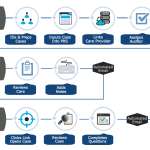
NCQA Health Plan Accreditation Updates for 2023
NCQA Health Plan Accreditation program provides a framework for assessing the quality of health plans and ensuring that they meet certain standards.
Home » Archives for Eric » Page 2

NCQA Health Plan Accreditation program provides a framework for assessing the quality of health plans and ensuring that they meet certain standards.

NCQA Health Plan Accreditation is a rigorous evaluation process that assesses the quality of health plans and their ability to meet the needs of their members. As part of the accreditation process, NCQA requires health plans to undergo third-party review.

To understand claim denials affecting reimbursement requires data. In healthcare, claim denials occur when an insurer or payer refuses to reimburse a healthcare provider for a particular medical service or treatment. Claim denials can occur for a variety of reasons, such as inaccurate or incomplete billing information, lack of medical necessity, or failure to follow the proper billing procedures.

Clinical peer review in modern performance management requires a secure, easy-to-use software system. Peer reviews are a form of performance evaluation that involve feedback from colleagues within the same profession or industry. In the healthcare industry, peer reviews are commonly used to evaluate the performance of clinical staff, including physicians, nurses, and other healthcare professionals.

Independent peer review plays a crucial role in revenue cycle management for the healthcare industry. Revenue cycle management (RCM) refers to the process of tracking patient care from registration to final payment, including all the administrative and clinical functions that contribute to the capture, management, and collection of patient service revenue.

Artificial Intelligence (AI) is rapidly transforming the healthcare industry, with the potential to revolutionize patient care and improve clinical outcomes. Over the next three years, we can expect to see AI have a tangible impact on healthcare in several ways.

Unplanned hospital readmissions occur when a patient is discharged from a hospital and then returns to the hospital within a certain time frame due to an unplanned medical issue. These readmissions can be costly for both the patient and the healthcare system. To reduce the number of unplanned hospital readmissions

Prior authorization is a utilization management process used by some health insurance companies for determining if the patient’s health policy covers a prescribed services, like procedures, tests, or medications, before services are rendered. While intended to control healthcare costs, prior authorizations can be a significant burden on healthcare providers and can delay patient care.

No Surprises Act (NSA) protects people covered under group and individual health plans from receiving surprise medical bills when they receive most emergency services, non-emergency services from out-of-network providers at in-network facilities, and services from out-of-network air ambulance service providers.

Top At-Risk Conditions and utilization spikes that healthcare leaders and stakeholders across the industry must prepare to proactively address in the upcoming year highlight the recently released, 2023 State of Health – In The Aftermath Report. The report also presents predictive findings and explores the top contributing factors of many utilization increases.